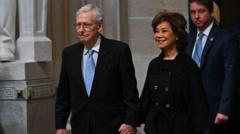Mitch McConnell, at the age of 83 and after a historic 40-year tenure in Congress, announced he will not run for re-election in 2026, signaling the end of an era and prompting reflections on his complex career.
Mitch McConnell Declares End of Political Journey, Will Not Seek Re-Election in 2026

Mitch McConnell Declares End of Political Journey, Will Not Seek Re-Election in 2026
The long-serving U.S. Senator bids farewell after decades in Congress, reflecting on his legacy and shifting political dynamics.
In a recent address on the Senate floor, Mitch McConnell confirmed he would not seek re-election in 2026, concluding a significant 40-year career marked by both partisan victories and controversies. Once a foundational figure in the Republican Party and notably the longest-serving party leader in Senate history, McConnell's announcement has stirred discussions about his legacy and the shifting political landscape.
Throughout his political journey, McConnell supported significant aspects of former President Donald Trump's agenda. However, as his term approaches its final chapter, he has emerged as a stronger critic of Trump, highlighting the need for Congress to assert its constitutional powers against presidential overreach. The Senator emphasized the importance of confirming federal officials committed to the rule of law, indicating a more complex relationship with the presidency than during his earlier years of tacit support for Trump's policies.
In his farewell speech, McConnell referenced his unfinished business, reinforcing the notion of legislative authority and the Senate's role as a co-equal branch of government. His contributions included controversial maneuvers, most notably the blocking of President Obama's Supreme Court nominee, which allowed Trump to reshape the judiciary towards a more conservative narrative. This action, which echoes in contemporary debates on issues like abortion rights and presidential powers, solidified his position as a pivotal player in the Republican strategy.
Despite having been viewed as a relentless adversary to Democratic initiatives, McConnell also demonstrated a willingness to support U.S. efforts abroad, particularly concerning Ukraine, which diverged from the isolationist tendencies within segments of his party. His tenure in the Senate has not been without criticism; his adaptability and willingness to manipulate Senate norms to achieve legislative aims have drawn ire from both sides of the aisle.
As McConnell prepares to step away from leadership, he expressed hope for the Senate's future durability, leaving behind a legacy intertwined with the evolution of the Republican Party and American politics as a whole. His departure ushers in the possibility of new leadership dynamics within the Senate, eliciting various reactions and reflections on his impact in national governance.



















